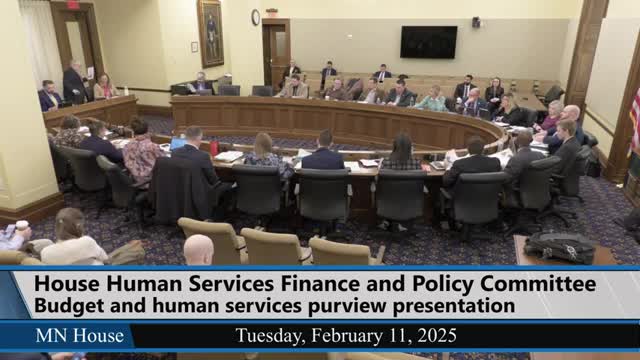House Research maps committee jurisdiction, notes background‑study delays across DHS, DCYF and MDH
Get AI-powered insights, summaries, and transcripts
Subscribe
Summary
House Research outlined the statutory chapters under the Human Services committee's jurisdiction and House members raised delays in background studies used across human services, child care and health licensing systems.
House Research staff reviewed the statutory chapters and policy areas that fall within the House Committee on Human Services Finance and Policy and told the committee where authority for programs and licensing sits.
Sarah Sunderman and Danielle Penelli of House Research walked members through statute chapters the committee will likely cover this session, including Chapter 245 (Department of Human Services and related administrative sections), Chapter 245A (human services licensing), Chapter 245C (human services background studies), Chapter 245D (Home and Community‑Based Services standards), Chapter 246/246C (state‑operated services and the new Direct Care and Treatment agency), Chapter 252 (services for persons with developmental disabilities), and various sections of Chapter 256 that govern medical assistance, housing support, economic assistance, and long‑term care programs. They also identified behavioral‑health‑related chapters (including chapters cited as 245F and 245I) and cited statutory sections governing vulnerable adult reporting (Minn. Stat. §626.557 to §626.5573).
Representative Heather Keeler raised concerns about the backlog in background studies and asked which background checks fall under the committee’s jurisdiction. Sarah Sunderman said Chapter 245C covers DHS background studies, which also are used by the Department of Children, Youth and Families (DCYF) and some Department of Health (MDH) licensing processes, and that the system covers a broad range of workers across multiple programs. Keeler said in parts of Greater Minnesota she has been told people wait six to eight weeks for background studies needed for daycare workers and other positions.
“Background studies are a massive burden,” Keeler said, summarizing the concern voiced by multiple members; she asked the committee to keep the issue on the radar given its effect on childcare access, nursing and senior living workforce availability.
Representative Steve Gander and others asked about how to prioritize committee work and whether assisted‑living licensure (Chapter 144G) belongs in the Human Services committee or should remain with the Health Committee. House Research staff said assisted‑living licensure is administered by the Department of Health and has been treated as within Health Committee jurisdiction; members suggested revisiting that allocation because many programs in human services interact with assisted living.
House Research emphasized that the committee’s work spans licensing, background studies, long‑term care waivers, behavioral health, homelessness and economic assistance, and that staff can provide more detailed statute crosswalks and the budget book to help members prioritize items for the session.
Ending: Committee members asked House Research to return detailed statute crosswalks and to coordinate with fiscal staff and DHS on material for upcoming hearings.
